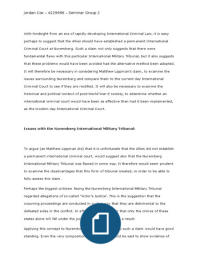Essay
Nuremberg and Tokyo Military Tribunals - Should an International Criminal Court have been adopted instead?
- Module
- International Criminal Law
- Institution
- The University Of Nottingham (UON)
A formative essay written during an International Criminal Law module. Marked as a 2:1 answer
[Show more]



